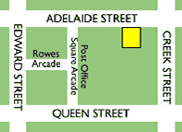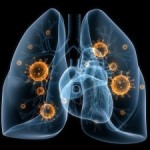Seniors risking ‘golden years’ by not protecting against pneumonia
May 2nd, 2014MEDIA RELEASE
‘Love Your Lungs at 65 Years Young’ this Pneumonia Awareness Week
Almost two-in-three Queensland seniors may be jeopardising their ‘golden years’ by not protecting against an often fatal lung infection, despite being at increased risk.1
Lung Foundation Australia’s ‘Love Your Lungs at 65 Years Young’ research released today reveals 94 per cent of Queenslanders aged 65 to 74 do not recognise age as a risk factor for pneumonia, while fewer than half correctly understand vaccination can defend against pneumococcal pneumonia1 – a severe form of pneumonia caused by the bacterium Streptococcus pneumoniae2 responsible for 82 per cent of pneumonia cases among those aged 65 years and over.3
According to respiratory physician and Lung Foundation Australia Board Member, Dr Lucy Morgan, Sydney, while Queensland seniors focus strongly on heart, skin and breast health, they tend to ignore their lung health, even though pneumonia-like illness (pneumonia and influenza) is among the top 10 contributing causes of death in Australia.4
This Pneumonia Awareness Week (April 28 – May 4) Lung Foundation Australia is urging all Queensland seniors aged 65 and over who are considered ‘at-risk’ of contracting pneumonia, and those eligible for a five-year booster vaccine, to recognise its seriousness and protect against the infection.
“This year the number of Australians turning 65 and over will exceed three million,”5 said Dr Morgan.
“Each year, the number of new cases of pneumococcal pneumonia rises exponentially among those aged between
50 and 80 years, to nearly 200 per 100,000.3
“That’s why it’s imperative that Queenslanders celebrating their ‘golden years’ take advantage of recommended and government-funded vaccination against pneumococcal pneumonia,” Dr Morgan said.
Pneumococcal vaccination is listed on the National Immunisation Program (NIP) and funded under Immunise Australia for all Australians aged 65 and over, with many eligible for a second vaccine five years following their first dose.3,6,7
Dr Deb Mills, Travel Health specialist and Medical Director of Dr Deb’s Travel Medicine Clinics, Brisbane, says pneumococcal pneumonia should not be underestimated.
“Pneumococcal pneumonia is responsible for approximately 1.6 million deaths each year worldwide.8
“It’s concerning that even among those aged 65 and over with additional risk factors, such as diabetes, chronic lung, heart or kidney disease, impaired immunity or being a smoker, the new Lung Foundation Australia research shows only 13 per cent of this age group recognise they are at high risk of contracting pneumococcal pneumonia,” said Dr Deb.
As many as 44 per cent of Queenslanders aged 65 to 74 cite the reason for not having the first pneumococcal pneumonia vaccination is because their doctor has not recommended it, while 39 per cent know nothing about the booster vaccination or why it might be necessary. Furthermore, just 30 per cent of survey respondents who had not been vaccinated against pneumococcal pneumonia, intend to do so in the future.1
“While the message about influenza vaccination is clearly resonating, the message about pneumococcal pneumonia vaccination is not,” Dr Deb said.
The new research reveals Queenslanders aged 65 to 74 are more likely to have been vaccinated against the flu (74 per cent) than pneumococcal pneumonia (39 per cent). While pneumonia often arises after a cold or flu, 61 per cent of survey respondents fail to differentiate between the flu and pneumonia.1
“Worryingly, Queensland seniors cannot differentiate between pneumonia and the flu,1 and how best to protect themselves,” said Dr Deb.
more#
Teacher, widow, mother-of-three and grandmother-to-seven, Gay, Brisbane, was unaware of the seriousness of pneumonia before contracting the potentially life-threatening infection in August, 2012. Not suspecting her chronic asthma and age (over 65) placed her at increased risk of pneumonia, Gay’s active lifestyle was turned upside down and she was left bed-ridden for days.
One evening, Gay began experiencing acute asthma-like symptoms, including chest pain and difficulty breathing, triggered by heavy smoke in the air.
“It was a horrific experience. I had a constant, terrible cough, which resulted in heavy chest and back pain.
“I was house-bound for days, living on my own, and only able to fall asleep with hot water bottles sitting on my chest to support my back,” said Gay.
“My neighbor purchased medical supplies for me from my local chemist as I simply couldn’t move.”
Seven weeks following Gay’s diagnosis of pneumococcal pneumonia, she was able to return to her GP for a pneumococcal vaccination to help reduce her risk of re-acquiring the infection. Gay plans to have her booster vaccination in the next few years.
“If I had have known I was at high-risk for contracting pneumonia, I would have talked to my doctor about how to help protect against the potentially life-threatening infection a long time ago.”
This Pneumonia Awareness Week, Lung Foundation Australia is urging seniors to be aware of the seriousness of pneumonia and to ‘Love Your Lungs at 65 Years Young’, by protecting against this potentially life-threatening infection.
“It’s important for Queensland seniors to understand that their age alone puts them at heightened risk of contracting pneumonia,” said Lung Foundation Australia Director, Ms Heather Allan, Brisbane.
“Queenslanders aged 65 and over should talk to their doctor about how best to protect against pneumococcal pneumonia, including government-subsidised vaccination.”
For more information about Pneumonia Awareness Week, visit www.lungfoundation.com.au or call Lung Foundation Australia on 1800 654 301.
About pneumonia, pneumococcal pneumonia and vaccination
Pneumonia is a potentially life-threatening lung infection that affects the lungs. The lungs are made up of small sacs which fill with air when a healthy person breathes. When a person has pneumonia, these sacs fill with pus and fluid, which makes breathing painful and limits oxygen intake.9 Pneumonia may be caused by a virus, bacteria or fungi.10 Pneumococcal pneumonia, caused by the bacterium Streptococcus pneumoniae,2 is the only type of pneumonia for which vaccination is available.
The pneumococcal vaccine is listed on the National Immunisation Program (NIP) and funded under Immunise Australia for all Australians aged 65 and over, with some eligible for a second vaccination five years following their first dose.6,3,7
About the Love Your Lungs at 65 Years Young survey1
The ‘Love Your Lungs at 65 Years Young’ Galaxy Research survey was conducted online, among a representative sample of 752 Australians aged 65 to 74, living in both capital and non-capital city areas, from April 1 to 3, 2014. The collated data was weighted by age, gender and region to reflect the latest population estimates.
The survey garnered the attitudes of 65 to 74 year old Australians towards, and understanding of, the seriousness of pneumonia and the importance of protection against the potentially life-threatening infection.
About Pneumonia Awareness Week 2014
Pneumonia Awareness Week (Monday, April 28, to Sunday, May 4, 2014) is designed to educate Queenslanders in their ‘golden years’ (aged 65 and over) at-risk of pneumonia, to recognise the seriousness of pneumonia, and ask their doctor how best to protect themselves from contracting pneumococcal pneumonia, including vaccination.
About Lung Foundation Australia
Lung Foundation Australia was established in 1990 by thoracic physicians concerned about the chronic shortage of funds for research into respiratory medicine and the impact of lung disease on the community. Lung Foundation Australia aims to ensure lung health is a priority for all Australians.
References
1. Pneumococcal Pneumonia Study. Conducted by Galaxy Research, commissioned by Lung Foundation of Australia (LFA). April 2014.
2. Harrison C, Britt H. Pneumococcal vaccination among patients at general practice encounters 2013.
Byte from BEACH No: 2014;1 Sydney. FMRC, University of Sydney, 2014.
3. Hogg GG, Strachan JE, Lester RA. Invasive pneumococcal disease in the population of Victoria. Med J Aust 2000; 173: S32-S35.
4. Better Health Victoria and Department of Health – Communicable Disease Prevention and Control Unit. Pneumococcal disease fact sheet. 2011. Available at http://www.betterhealth.vic.gov.au/bhcv2/bhcpdf.nsf/ByPDF/Pneumococcal_disease/$File/Pneumococcal_disease.pdf [last accessed April, 2014].
5. Australian Bureau of Statistics. 3101.0 – Australian Demographic Statistics, Sept 2013. Available at http://www.abs.gov.au/ausstats/abs@.nsf/mf/3101.0. [last accessed April, 2014].
6. AIHW 2010. Australia’s health 2010. Australia’s health no. 12. Cat. no. AUS 122. Canberra: AIHW.
7. MacIntyre CR. Elderly vaccination – The glass is half full. Health 2013; 5(12A): 80-85.
8. Sousa D, Justo I, Domınguez A, et al. Community-acquired pneumonia in immunocompromised older patients: incidence, causative organisms and outcome. Clin Microbiol Infect 2012;19(2): 187-92.
9. World Health Organization (WHO). Pneumonia fact sheet; November 2012. WHO. Available at http://www.who.int/mediacentre/factsheets/fs331/en/ [last accessed April 2013].
10. Rozenbaum MH, Pechlivanoglou P, van der Werf TS, Lo-Ten-Foe JR, Postma MJ, Hak E. The role of Streptococcus pneumoniae in community-acquired pneumonia among adults in Europe: a meta analysis. Eur J Clin Microbiol Infect Dis 2013; 32: 305-316.




